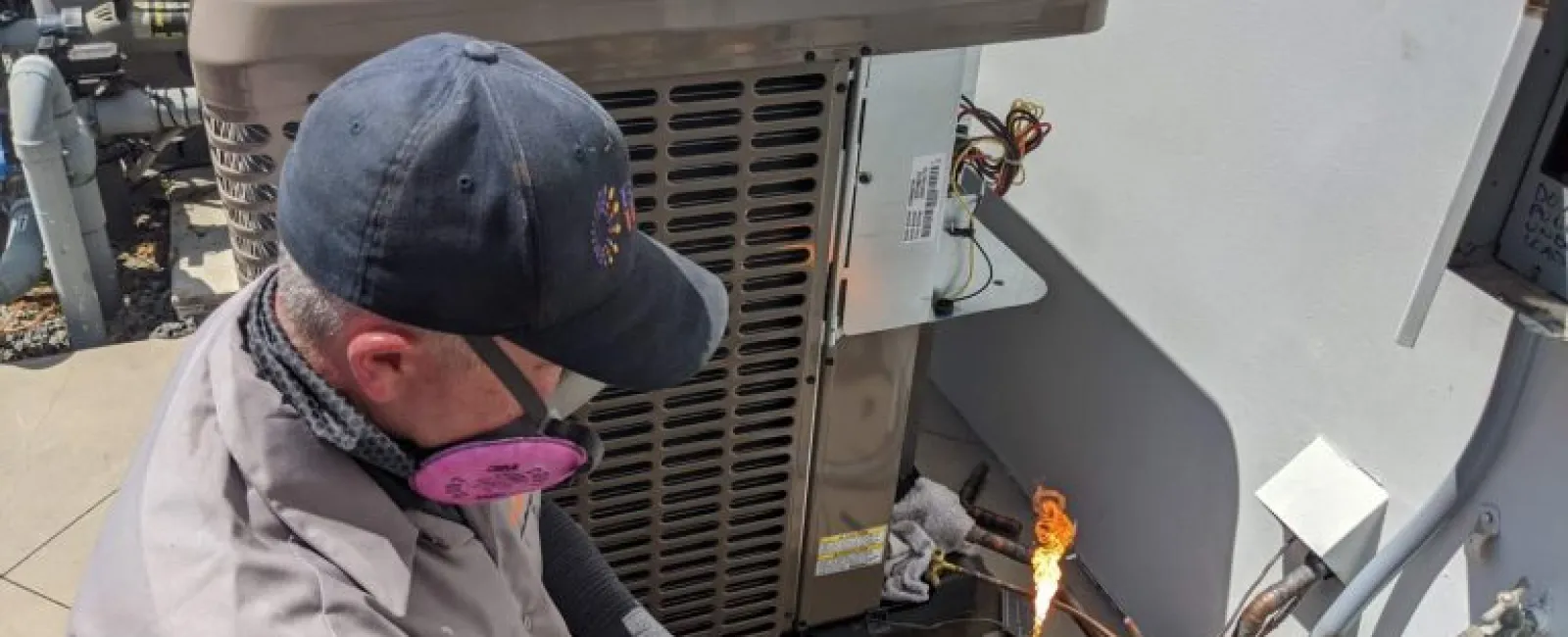November 14, 2025
If you've discovered a puddle of water around your HVAC system, you're not alone. Water leaks are one of the most common AC problems homeowners face in Southern California. The good news? Most HVAC leaking issues have simple explanations and straightforward solutions.
Quick Answer: Your HVAC is likely leaking water due to a clogged condensate drain line, dirty air filter, frozen evaporator coil, or a cracked drain pan. In LA and Orange County's hot climate, these issues become even more common during summer when your AC works overtime.
The Top 5 Reasons Your AC Unit Is Leaking Water
1. Clogged Condensate Drain Line (Most Common)
Your air conditioner produces condensation as it cools your home. This moisture normally flows through a condensate drain line to the outside. When this line gets clogged with algae, mold, or debris, water backs up and leaks into your home.
Signs: Water pooling around your indoor unit, musty odors, or visible standing water in the drain pan.
Quick Fix: Pour a cup of white vinegar or bleach down the drain line every few months. For stubborn clogs, use a wet/dry vacuum to suction out debris from the outdoor end of the drain line.
2. Dirty or Clogged Air Filter
A dirty air filter restricts airflow over your evaporator coil, causing it to freeze. When the ice melts, excess water overwhelms your drain system and leaks onto your floor.
Signs: Reduced cooling, ice buildup on refrigerant lines, or higher energy bills.
Quick Fix: Replace your air filter every 1-3 months. In Orange County's dusty climate, monthly replacement is often necessary.
3. Low Refrigerant Levels
When your HVAC system runs low on refrigerant, the pressure drops and causes your evaporator coil to freeze. Like the dirty filter issue, this creates excess water when the ice melts.
Signs: Warm air from vents, hissing sounds, or ice on the copper refrigerant lines.
Professional Help Needed: Low refrigerant usually indicates a leak. A licensed HVAC technician must find and repair the leak, then recharge your system properly.
4. Cracked or Rusted Drain Pan
The drain pan sits beneath your indoor air handler to catch condensation. Over time, especially in humid coastal areas like Long Beach or Huntington Beach, these pans can rust, crack, or develop holes.
Signs: Water leaking directly beneath your indoor unit, visible rust or cracks in the pan.
Solution: Replace the drain pan. This is a straightforward repair for most HVAC professionals.
5. Improper Installation
If your HVAC unit wasn't installed level, water can't properly drain from the condensate pan. This is particularly problematic in older Southern California homes where settling has shifted the unit.
Signs: New system leaking from day one, or leaks that started after recent work.
Solution: An HVAC technician can level your unit and ensure proper drainage.
Southern California Climate Considerations
LA and Orange County's hot, dry summers put extra strain on air conditioning systems. When your AC runs constantly during 90-degree days, it produces more condensation than usual. This increased moisture makes clogs and overflow more likely.
Coastal areas like Costa Mesa, Newport Beach, and Manhattan Beach face additional challenges from salt air, which accelerates corrosion of metal drain pans and components.
Should You Turn Off Your AC If It's Leaking Water?
Yes, turn off your system if you notice significant water leaking inside your home. Continuing to run a leaking AC can cause:
- Water damage to floors, walls, and ceilings
- Mold growth in as little as 24-48 hours
- Damage to electrical components
- Reduced system efficiency
However, if the leak is minor and coming from the outdoor condensate line (which is normal), you can continue using your AC while scheduling a service call.
DIY Troubleshooting Steps Before Calling a Pro
- Check your air filter and replace it if dirty
- Inspect the condensate drain line for visible clogs
- Pour vinegar down the drain line to clear minor blockages
- Look for ice on refrigerant lines or the evaporator coil
- Clear debris around your outdoor unit that might restrict airflow
When to Call an HVAC Professional in LA or Orange County
Contact a licensed HVAC technician if:
- You've tried DIY fixes and water continues leaking
- You see ice forming on refrigerant lines
- Your system won't cool properly
- You hear unusual hissing or bubbling sounds
- Water leaks are causing visible damage to your home
Preventing Future HVAC Water Leaks
Regular maintenance is your best defense against AC leaking water. Schedule professional tune-ups twice yearly (spring and fall) to catch issues early.
Between service visits:
- Replace air filters monthly during peak summer
- Pour vinegar down your drain line quarterly
- Keep outdoor unit clear of leaves, dirt, and vegetation
- Monitor for unusual sounds or reduced cooling
Cost Considerations for Orange County Residents
Repair costs for HVAC water leaks typically range from $75 to $450, depending on the issue:
- Drain line cleaning: $75-150
- Air filter replacement: $20-50 (DIY) or $75-100 (professional)
- Refrigerant leak repair: $200-1,500
- Drain pan replacement: $150-350
- Evaporator coil repair: $400-1,200
Regular maintenance ($150-300 per visit) often prevents these costly repairs.
Why Choose Local HVAC Service in LA and Orange County
Working with a local HVAC company ensures:
- Same-day or next-day service in emergencies
- Technicians familiar with Southern California climate challenges
- Proper licensing for refrigerant handling (required in California)
- Knowledge of local building codes and permit requirements
Final Thoughts
An HVAC leaking water is annoying but usually fixable. Start with simple solutions like changing your air filter and clearing the drain line. For persistent leaks or complex issues like refrigerant problems, contact a qualified HVAC professional in your area.
Don't ignore water leaks. What seems like a minor drip today can lead to major water damage and costly mold remediation tomorrow. When in doubt, call a professional to inspect your system and prevent small problems from becoming expensive disasters.



